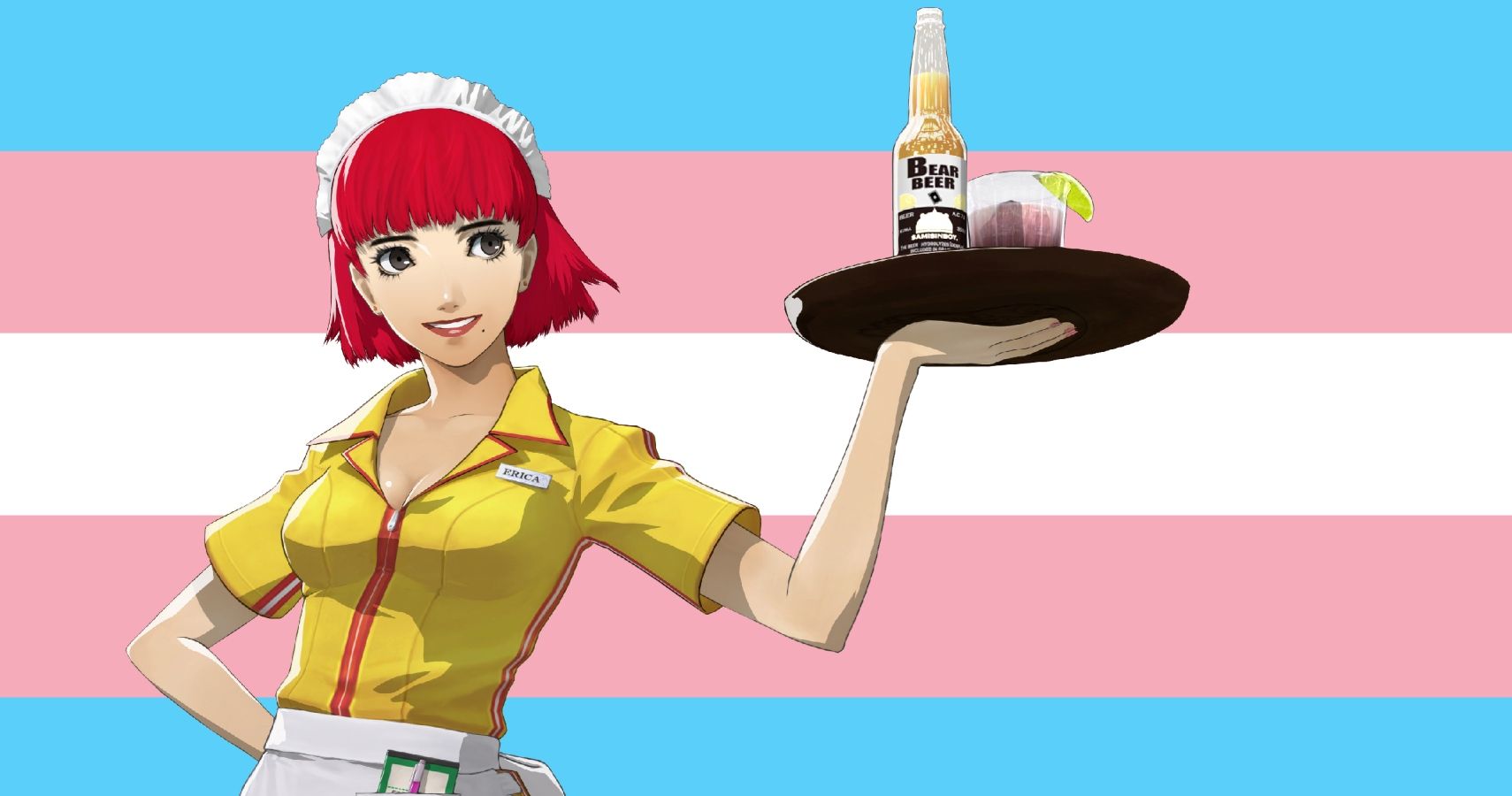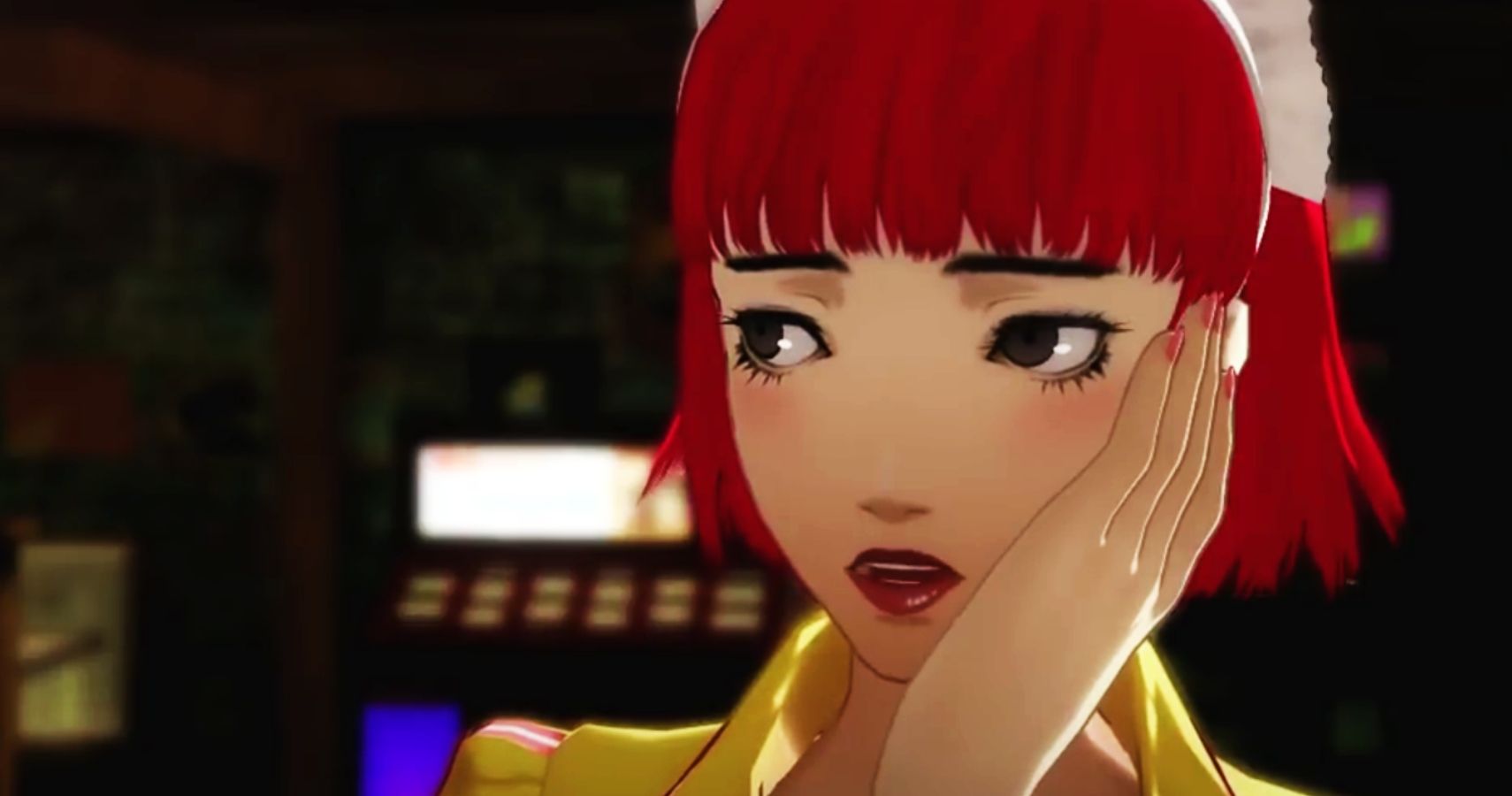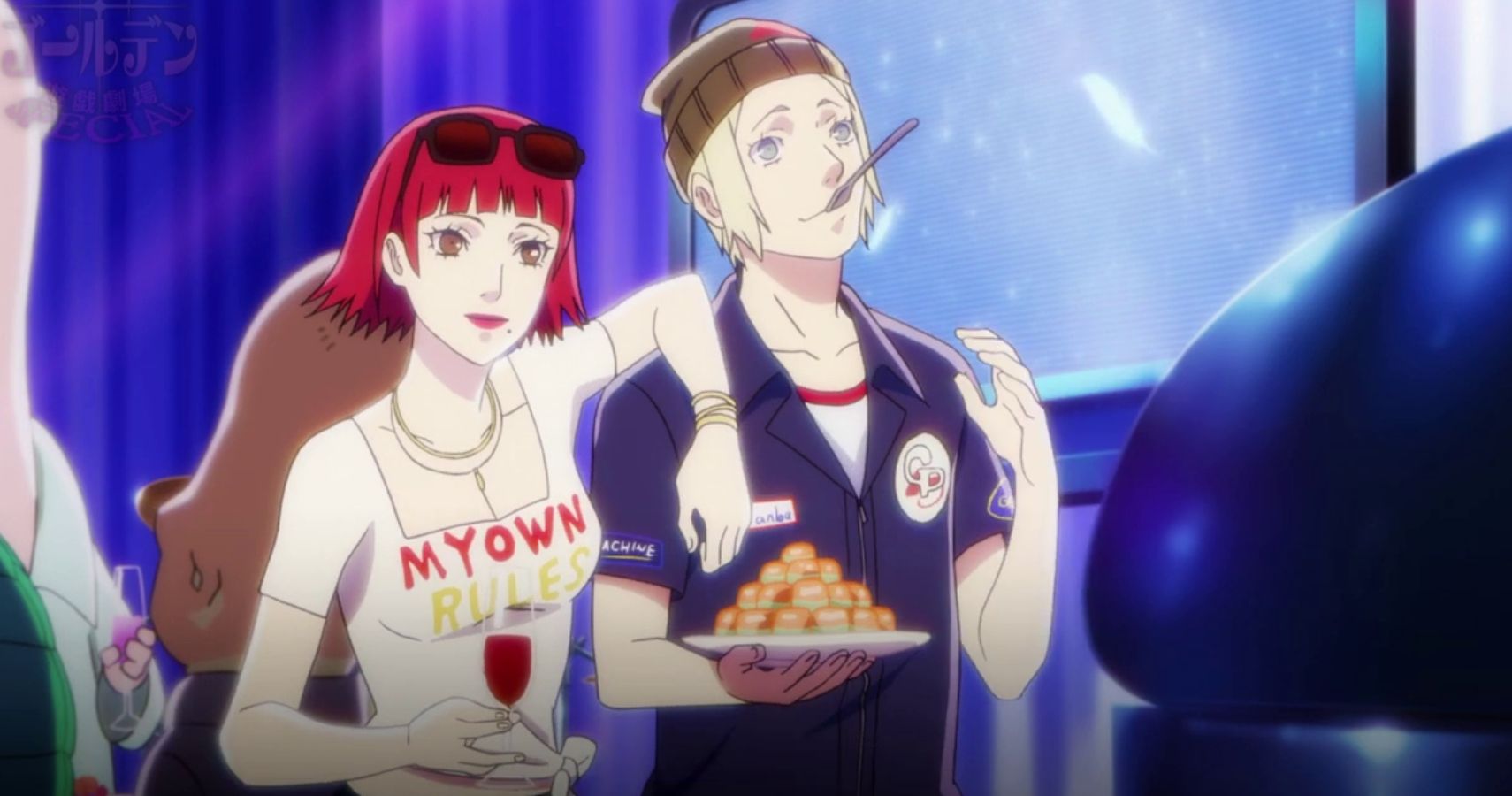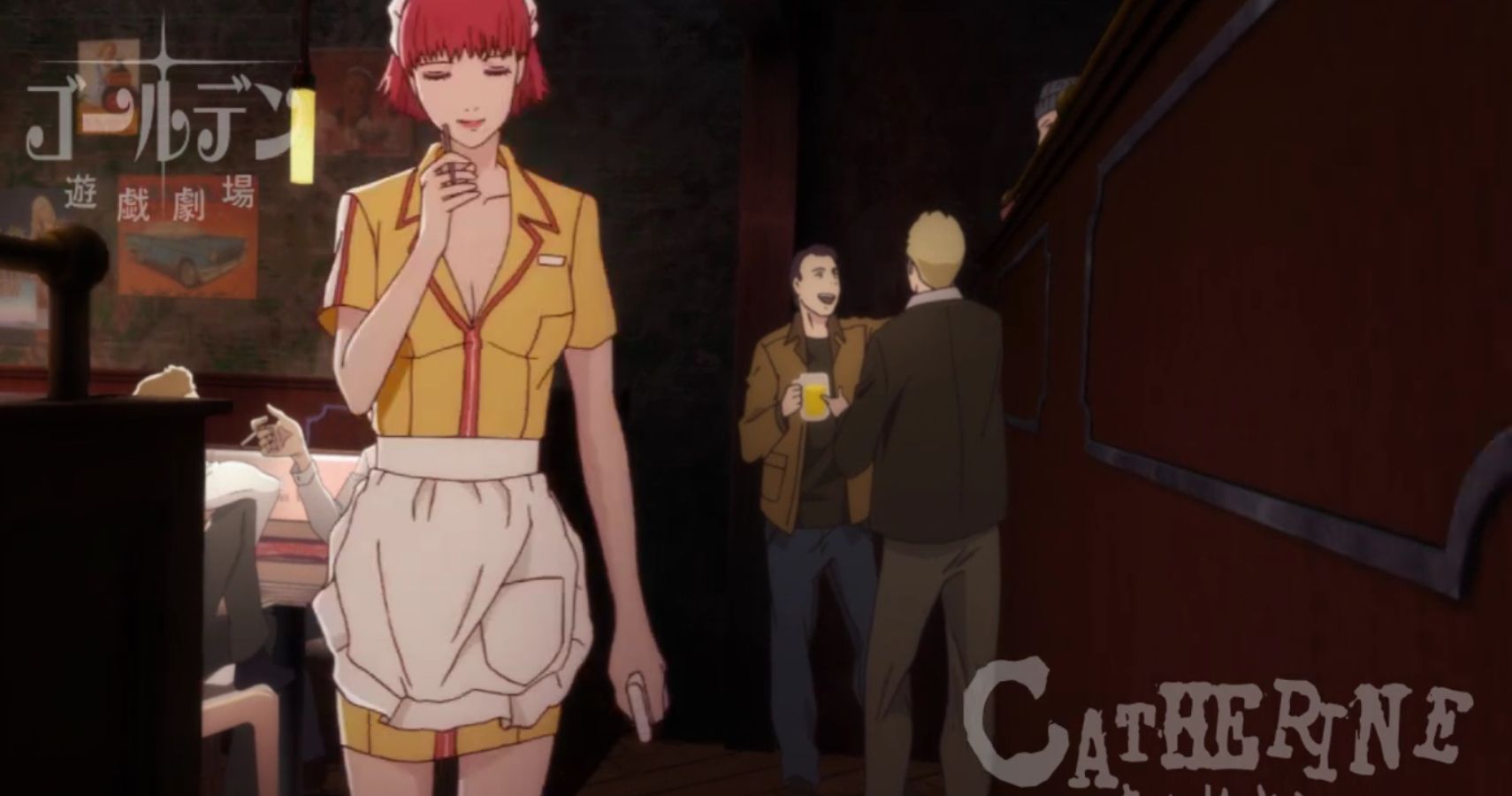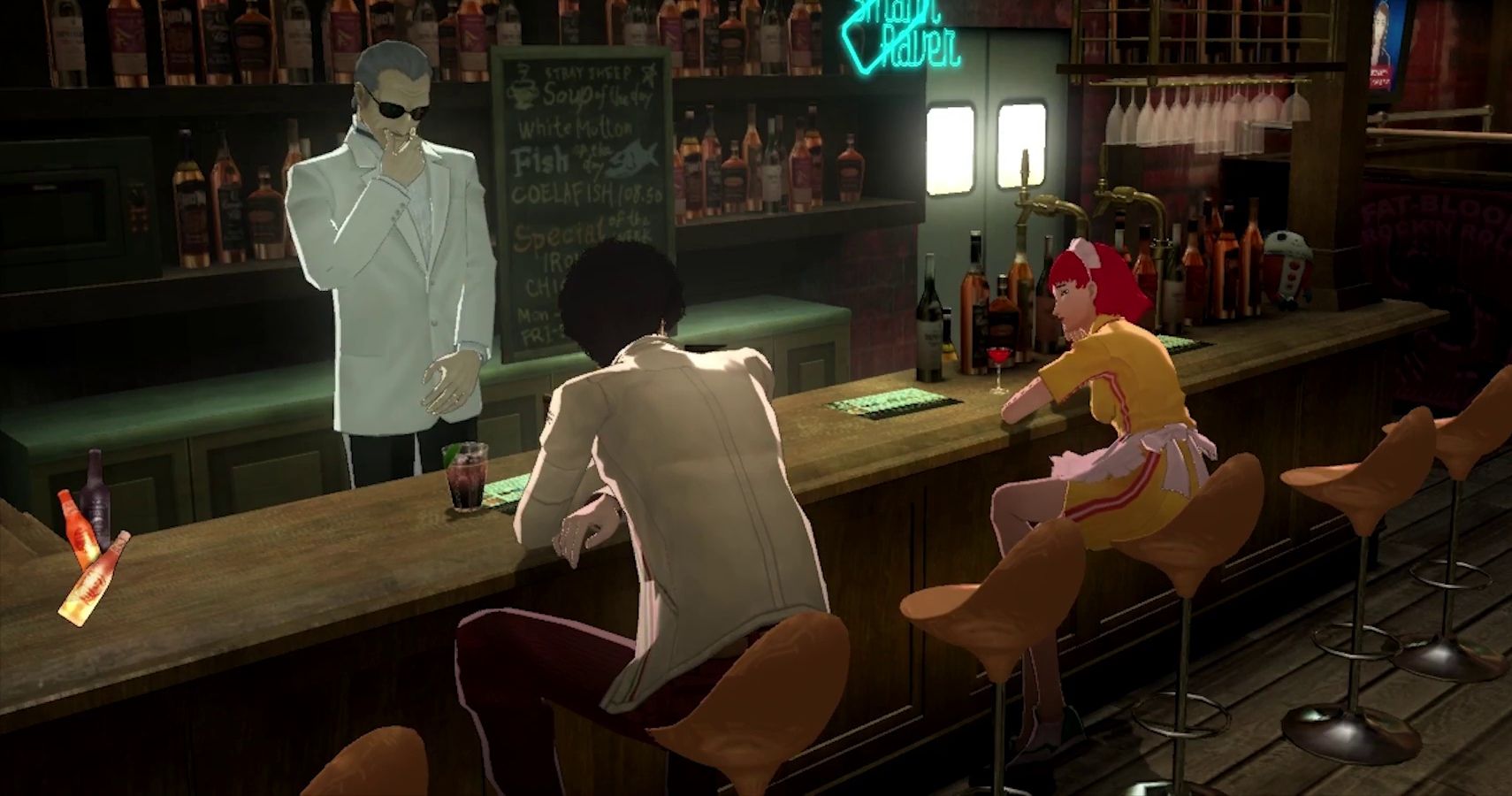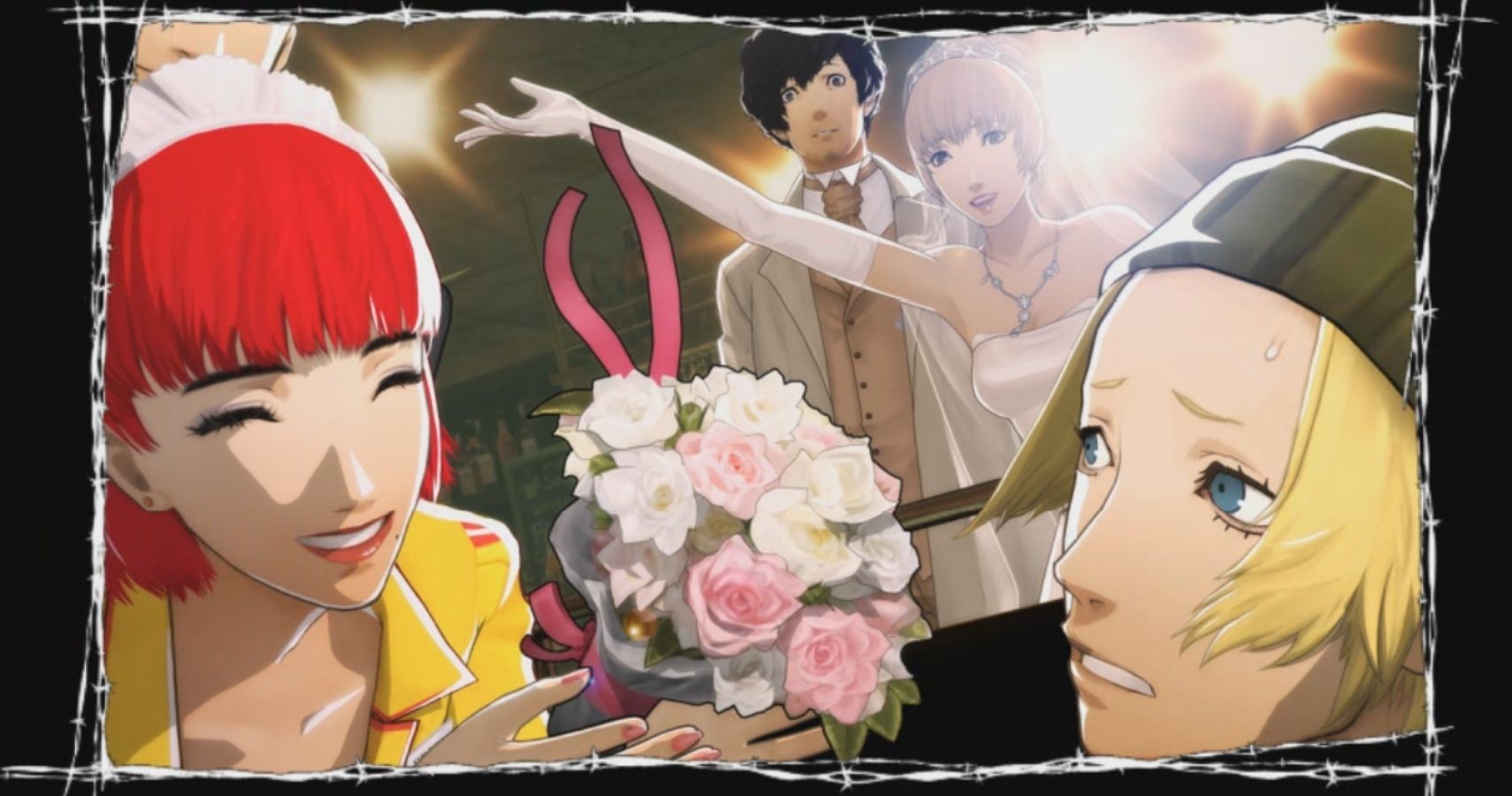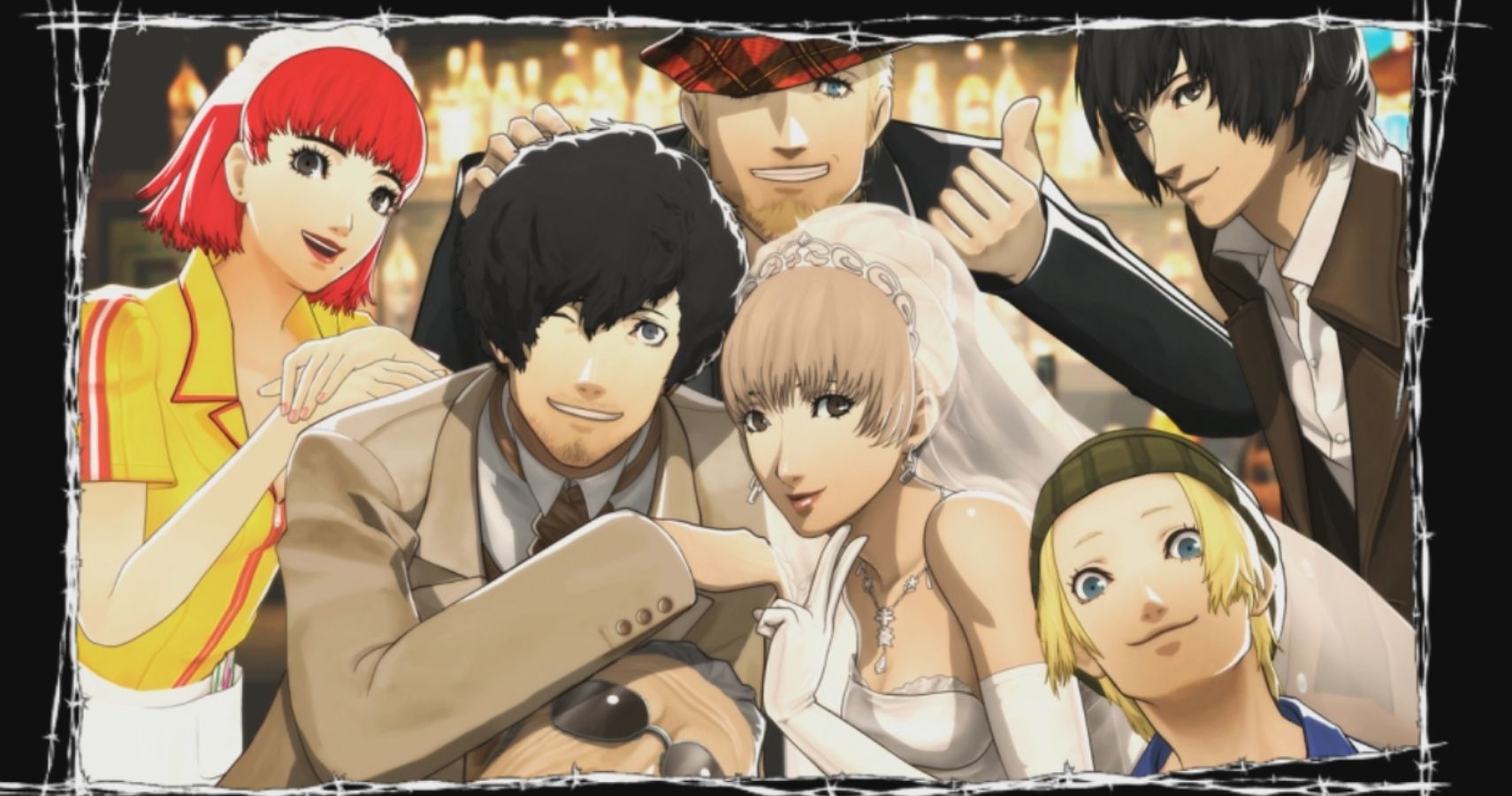For a game called Catherine, the titular femme fatale is hardly the most popular topic of conversation online. Instead, a particular redhead has proven to be a lightning rod for heated debate since the game’s initial release – one that has been struck once again with the upcoming release of Catherine: Full Body.
In 2011’s divisive character study, the main cast of characters spent most of their evenings in The Stray Sheep – a quiet, classy bar without very many patrons. Each night, they’re served by two people. One of these is the enigmatic Boss, a bespectacled bartender of mysterious origins who speaks in cryptic riddles. The other is perky, energetic, and wildly flirtatious Erica Anderson – a waitress with childhood ties to the rest of the cast.
Erica spends most of the game flirting with Toby, a naïve young man who’s unsure of how to process his feelings for the young woman. All the while, his friends gently poke and prod at Toby’s obvious crush on Erica, speaking in terms that signify she might be more than the young man is bargaining for. However, they never entirely dissuade him from hooking up with her, despite being seemingly clued into something about her that they’re refusing to disclose. When Toby winds up actually sleeping with her, he’s clearly put off but far from disgusted, yet we don’t really find out why until close to the game’s climax. It’s then that it becomes a little clearer.
You see, Erica’s a trans woman.
The Internet V. Erica Anderson
Assumed to be male, and following an extremely traumatic breakup, Erica began her transition process sometime after high school. This didn’t necessarily change her friendship with protagonist Vincent and the rest of the main ensemble, although it definitely seemed to add a newfound sense of friction to their dynamic. Vincent, in particular, seems to have an incredible callousness about referring to her as a woman, resorting to the occasional “man” at the end of a sentence, or making barbed comments that delegitimize her gender. This isn’t anywhere nearly as frequent with the rest of the characters, and in fact, most of them seem to not really be hung up on it at all.
Now, before we go any further, it’s worth pointing out that Erica has been made out to be a pariah by much of the more progressive sphere of the internet. Prominent peers in the industry often point to Erica as one of the most toxic portrayals of trans women to exist, period, full stop. When a remaster of the game was announced, critics were quick to draft up longwinded think pieces (like this one,) angry tweet threads, and in some cases, wild speculation regarding the remaster’s perceived worsening of its trans representation.
The transgender antichrist was coming back, it seemed, and only the hottest of takes could stop it.
Yet something hasn’t ever sat right with me about any of this. Full disclosure – I’m a trans woman myself, which means I’m opening up a whole new avenue for harassment with this article. Fun! But it’s necessary for me to say this, because I feel the need to push back against the widespread vitriol surrounding Erica and her characterization, and to a lesser extent, Vincent’s deliberately flawed depiction.
And by “push back,” I guess I mean, “emphatically and wholeheartedly disagree with.” Because in my mind, much of the community discourse built around Erica is reductive and kneejerk – based in blind anger and a seemingly deliberate misconstruing of the game’s intent, messaging, and morality. Furthermore, I feel as if the angry pushback and calls for boycotting the game only serve to further discourage larger studios from making any attempt at representing us – putting the onus on smaller independent studios to pick up that slack.
With this being said, then, let’s get into my personal opinions on Erica and the game’s treatment of her.
Erica Isn’t Defined By Her Trauma
The thing that immediately sticks out about Erica, to me, is how little overt oppression she seems to face in her day-to-day existence. So much media deals in transgender suffering – dwelling on just how horrible it is to exist, and how oppressed we all are. A lot of the time, this is done with white characters, which is disingenuous when you stop to consider that the predominant victims of transphobic violence are black and Latino. But I digress.
Erica is a character who very much isn’t defined by any kind of trauma – other than her aforementioned breakup. Players aren’t privy to harassment she faces in her day-to-day life, nor do they see any form of intense suffering or bodily harm inflicted upon her, nor do they ever get a glimpse of what she was like “as a boy.” Instead, Erica is plainly presented as Erica – with one offhand mention of her birth name delivered by Toby near the end of the game. Her depiction is very adjacent to the titular trans character in 1981’s Stop, Hibari-kun! in that sense.
In many ways, she’s actually the exact kind of trans character that the transgender community needs more of, with a lot of mainstream depictions (like Boys Don’t Cry, Dallas Buyer’s Club, Orange Is The New Black, Girl, and even Assassination Nation) offering little in the way of respite from our occasionally fraught and frequently frustrating existences.
Erica’s daily life seems barely affected by her existence as a trans woman. She “passes” perfectly, freely explores her sexuality on her own terms, and is respected as a woman by the world at large. In a world where I can speak to being harassed more frequently than I used to, Erica is comfort food for me. She makes me feel like her kind of life is maybe attainable, one day, somehow. It’s wild to me that this sort of characterization can be pegged as negative and turned into such a controversial talking point, let alone “evidence” that the writers are somehow bigoted.
From start to finish, Erica’s given the chance to lead a fulfilling, fun life doing something she loves and living on her own terms – a rarity for trans narratives.
Erica’s Struggles Are Believable
Which isn’t to necessarily say that Erica doesn’t have her own frustrations to deal with. There are smaller, less outwardly caustic reminders of her carefully constructed femininity that the plot navigates with relative grace.
The most obvious one relates to the game’s main narrative arc, which concerns a series of recurring nightmares that haunt the majority of a city’s men. In these dreams, men are turned into sheep and relentlessly pursued by overtly feminine monstrosities – forced to climb a collapsing tower of precarious death traps in order to survive. At some point in the game, Erica reveals to Vincent that she’s also been having these dreams – much to her own confusion. She muses that gender must not matter when it comes to these dreams, which leads to a major character to retort, “I’m not so sure…”
This moment encapsulates into Erica’s two largest conflicts in the narrative.
Firstly, the recurring nightmares are a grim reminder of her status as an AMAB (Assigned Male At Birth, or “biologically male,” if you’re emphatic about these things) woman. No matter how much she’s able to live a content life as a woman, no matter how much she’s validated in her daily existence by her employer and by total strangers, there’s always something present that reminds Erica of her previous life. In this case, it’s a citywide nightmare, but that can easily be a stand-in for anything that causes trans women dysphoria – the agonizing mental disconnect between physical appearance and self-identified gender. Body hair, a deep voice, what’s between your legs… dysphoria comes in all sorts of shapes and sizes, and in Catherine’s case, the nightmare could be a metaphor for any universally “male” experience that invalidates Erica on an internal level.
Secondly, Erica faces interpersonal turmoil among her friend group. While her friends are by and large accepting of her, there’s occasional slippage in their language with her that belies a long-term familiarity with her prior to her transition. I’m of the opinion that this isn’t “problematic” so much as it is “painfully true to life.” If you know people for most of your life, and you transition several years after the fact, there’s going to be a difficult adjustment. There are going to be accidental references to your old name, your old gender, and several other identifying facets of your old life.
Yes, that’s “problematic. But guess what? Real life is problematic. Real people are also problematic. To completely damn a game for depicting this slow, often agonizing process that’s all too real for many trans people is, in my mind, to deny the inconvenient and frustrating realities that come with transitioning.
However, there are instances where a line is seriously crossed – and that all mainly falls on one man.
Vincent Is The Actual Worst (Which Is The Literal Point Of The Game)
Vincent is arguably the sole perpetrator of outward verbal transphobia against Erica throughout Catherine. He argues why she shouldn’t be allowed to compete in women’s wrestling. He constantly pushes against her legitimacy as a woman. He’s the one out of the main cast who frequently refers to her as a man. By and large, he seems seriously unwilling to accept Erica as a woman – much to her own anger, and the seeming discomfort of his other friends. For all intents and purposes, Vincent seems like a kind of not great person.
Which is because he’s not.
In fact, that’s literally the entire point of Catherine. This is something that seems to go over the heads of many players, and is often at the heart of any argument for this game being “problematic.” At most points of the game’s narrative, it’s pretty explicit that Vincent is making the worst choices possible. Continually cheating on his fiancé with a weird, codependent teenager? Bad. Sticking with said fiancé after she lies about being pregnant? Bad. Drinking to cope with his problems daily? Bad. You can look at practically every choice Vincent is given in the game and point to the fact that they’re all terrible. This is reinforced by the fact that his friends routinely scold him for cheating, point to how his relationship is flawed, and push for him to get his shit together. Vincent is a fatally flawed protagonist, and Catherine is a game that goes out of its way to remind us of that at every single turn.
This isn’t reading between the lines, by the way – it’s something baked into his design and characterization. Vincent is deliberately based on Vincent Gallo’s Billy Brown, protagonist of cult film Buffalo 66. In that movie, the ex-con protagonist kidnaps a teenage tap dancer and forces her to pretend to be his wife for his parents, just so they’ll think he has his life together. Billy is generally portrayed to be a completely dysfunctional sack of garbage, with only the smallest hint of improvement in the last few moments of the movie. The audience is not really ever supposed to like him, let alone identify with him. While Catherine’s Vincent is far less of a toxic waste dump of a human being, he’s still generally portrayed as a train wreck that most people don’t seem to genuinely like.
So, when we look at his behavior towards Erica, it makes complete sense. Of course he’s bigoted, especially towards the woman who calls him out for his patently awful behavior the most. Of course he’s unwilling to let go of the past, because he still hangs out with the same people he did in high school. Of course he doesn’t see Erica as a woman, because his own perspective on women is incredibly skewed. To point to Vincent and say that he’s a stand-in for the writers is to not apply a truly nuanced reading to the text, and to ignore the countless in-game instances of Vincent’s behavior blowing up in his face. Worse, it belies a deep misunderstanding of what it means to have an imperfect protagonist.
Do we look at characters like Night In The Woods’ Mae, Welcome to the NHK’s Satou, Lolita’s Humbert or Chasing Amy’s Holden as perfect people that we want to emulate and whose worldviews we should adopt? No. Of course not. Therefore, we should keep that in mind when it comes to Erica as seen through Vincent’s eyes.
Erica Is A Product Of Her Creators' Culture
With all this being said, I’ll be the first to admit that game’s handling of Erica isn’t totally spotless. The credits do refer to her by her deadname, as does the official artbook. There’s also something to be said for the humorous discomfort Toby feels about sleeping with Erica, as it jokingly plays into harmful stereotypes that lead to trans women getting assaulted or murdered under “trans panic” protection laws. These are two warts on the character that are definitely hurtful - but as hurtful as they are, it's important to understand them in the context of Catherine being a Japanese game versus a Western one.
As a Westerner, I have a bit of reluctance to speak on the Japanese queer community as a whole. I have no personal stakes in the ongoing struggles for legitimacy in the face of an increasingly conservative government, so speaking with any degree of authority on that front is a slippery slope. Before we get too deep into criticisms of Japan’s media, it’s important to point out that the misconception that non-western countries are less liberal than America is an easy view to fall into, but still very much a misconception. Japan has its own very rich history of gender non-conformity (especially in theatre) and LGBTQ culture, even having their first openly transgender elected official as far back as 2003. Not to mention, a lot of the conservatism that it’s struggling with right now was actually forcibly exported to them by America in the 20th century. They’re not lagging behind America on the hypothetical “progress track” so much as following their own path.
That being said, it's crucial to address the contemporary cultural context that Erica was produced in. In many ways, she's a bit of an anomaly when it comes to depictions of transgender characters in mainstream Japanese media. Her transgender status, while definitely brought up by the primary cast, isn't turned into a particularly mean-spirited joke that serves to humiliate and discourage her, nor is it presented in ambiguous terms.
Yet the cultural hangups over trans people are definitely embodied in her character. In particular, Erica expresses remorse at being unable to have children - a reference to the fact that trans people are legally required to be sterilized in Japan. As Japanese critic Kazuma Hashimoto points out in his breakdown of the character, the fact that she's unable to reproduce is meant to signify that she's untrustworthy on some level - or, in other words, this is supposed to be a major character weakness tantamount to Vincent's own flaws. That might not be immediately obvious to a Western player, but it's impossible to ignore when looking at it in the context of the game's Japanese origins.
Another thing worth mentioning is Erica's overtly sexual nature. In America, it's easy to see this as something empowering or liberating, especially in a society where our own sexuality is constantly shamed. However, this is also a byproduct of Japanese perceptions of transgender people, and of queer people as a whole. Trans, gay, and bi people are often referred to as "seiteki shousuusha," typically abbreviated as "seku mai." Roughly translated, this means "sexual minorities," and it's a label applied to people with certain kinks. If you're a member of the BDSM community, for example, you'd also fit under this umbrella. This is frustrating, because to describe gender or sexuality as a "kink" or "sexual preference" is disingenuous, considering that sex isn't what defines sexuality for many. With this lens, then, Erica's existence as an outwardly sexual woman could be perceived as a barb versus a positive portrayal.
One other point is the fact that P Studio has a pretty precarious history with trans characters, in general. Persona 3 features a scene in which a trans woman is outed, much to the shock and horror of the protagonists, and is forced to run away in humiliation - played off as a joke. But more pressing is the character of Naoto in Persona 4, who presents as male for the majority of the game, only to be "revealed" as a woman. If the protagonist chooses to romance Naoto, all pretenses of potential trans-ness are erased, leading to scenes in which the protagonist basically "loves" Naoto hard enough to become more outwardly feminine. Yikes. It's a wildly misguided story arc, and while some argue that Naoto is heavily inspired by cross-dressing characters like Princess Knight or The Rose of Versailles' Oscar, it's something that didn't sit right in the mid-aughts, and still doesn't today.
Erica Is Perfect For Our Imperfect World
With that in mind, Erica Anderson remains one of the most important trans characters in gaming. In a AAA production, she stands head and shoulders with the rest of the cast, with her personality taking priority over her trans-ness. Her gender is legitimized in the context of the story, even with Vincent’s mean-spirited comments, and her struggles are amplified versions of everyday problems faced by real trans people.
Yes, there are aspects of her depiction that are flawed, but to throw the baby out with the bathwater belies an emotional immaturity when it comes to trans depictions in the media. To label something as “problematic,” through and through, and to emphatically push for a boycott is to completely damn any of the legitimately good work done by the writers. To even suggest that this is the most offensive portrayal of trans people out there, or even close, is an overblown exaggeration based in alarmist language that generates clicks and encourages social media engagement. And to verbally and publicly humiliate the writers of the game instead of trying to open a dialogue with them… well, that’s a good way to ensure they never even try to improve.
Erica Anderson is incredibly valid, and in this fickle, imperfect world we live in, so is her depiction.

